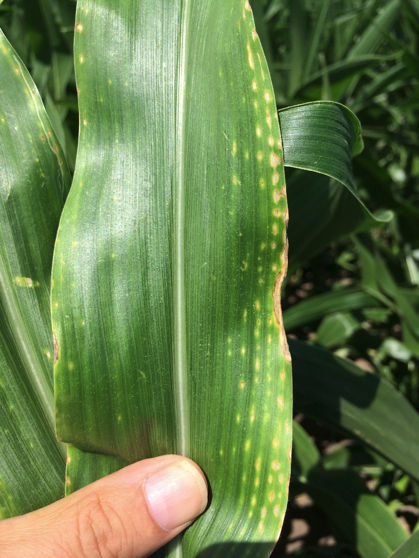Magnesium in Corn
March 28, 2024
- Magnesium (Mg) is one of the three secondary macronutrients that are essential for plant growth because it is part of the chlorophyll molecule, making it particularly important for photosynthesis.
- Without Mg, plants would not be able to use chlorophyll to capture light energy from the sun or turn it into sugars.
- Magnesium is also crucial for the uptake of other nutrients, such as phosphorus, and helps activate specific enzyme systems.
Soil magnesium (Mg) is attached to organic matter and clay particles as Mg2+, which is generally available to plants. However, instances of Mg deficiency typically occur in acidic and/or sandy soils when the soil pH is less than 5.5. Soil tests can be used to determine the amount of plant-available Mg in the soil and tissue samples may be taken to determine Mg levels in the plant.
Plant tissue samples should be collected in slightly different ways depending on when the Mg test is conducted during the growing season. Early in the season, the entire corn seedling should be used for analysis. After the seedling stage but before tasseling, the first fully developed leaf from the top of the plant should be sampled and submitted. To test after tasseling, use the leaves opposite and below the ear. Tissue test results should be used in conjunction with soil test results to best determine Mg levels.
Magnesium levels are adequate for corn production when Mg accounts for 15% of the soil’s total cation exchange capacity (CEC) value. A 2010 study from the University of Illinois determined that a 230 bushel/acre corn crop needs 52 lb/acre of Mg. Of the 52 lb/acre that were taken up by the crop in the study, 15 lb were removed with the grain; therefore, an additional 15 lb/acre of Mg would need to be applied to meet the next yield goal of 230 bu/acre.1
Magnesium Deficiency and Fertilization
Magnesium deficiency symptoms will occur in the oldest leaves first, because Mg is mobile in the plant and is relocated to newer growth when the Mg supply is low. Corn that is Mg deficient may first start to lose its healthy green color because a plant cannot produce chlorophyll—the pigment which drives photosynthesis and which gives plants their green color—without Mg. In addition, corn plants that are deficient in Mg will show symptoms of interveinal chlorosis in the lower, older leaves. Plant tissue between the leaf veins will turn yellow (chlorotic) while the leaf veins remain green. Severe cases of Mg deficiency may cause the lower corn leaves to turn red, purple, and/or necrotic (dead plant tissue) on the leaf tips and margins (Figure 1).

Dolomitic limestone is the most common magnesium-containing fertilizer used to supply Mg before planting, typically in the fall. If the pH of the field is between 6.0 and 6.5, lime would not be needed, and other sources of Mg should be used instead. Magnesium sulfate (Epsom salt) or potassium-magnesium sulfate may be applied in-season to help correct soils that are Mg deficient.
Sources
1 Bender, R.R., Haegele, J.W., Ruffo, M.L., & Below, F.E. 2013. Nutrient uptake, partitioning, and remobilization in modern, transgenic insect-protected maize hybrids. Agronomy Journal. 105(1): 161–170. https://doi.org/10.2134/agronj2012.0352
Additional Resources
Kaiser, D. 2016. Magnesium for crop production. University of Minnesota Extension. https://extension.umn.edu/micro-and-secondary-macronutrients/magnesium-crop-production
Oldham, L. 2019. Secondary plant nutrients: calcium, magnesium, and sulfur. Mississippi State University Extension, Information Sheet 1039. https://extension.msstate.edu/sites/default/files/publications/information-sheets/is1039_web.pdf
Schulte, E.E. 2004. Soil and Applied Magnesium. University of Wisconsin-Extension, A2524. https://soilsextension.webhosting.cals.wisc.edu/wp-content/uploads/sites/68/2014/02/A2524.pdf
Sneller, E. 2011. Magnesium deficiency issues in Michigan corn fields. Michigan State University Extension. https://www.canr.msu.edu/news/magnesium_deficiency_issues_in_michigan_corn_fields
Web sources verified 03/22/24. 1214_387601
Seed Brands & Traits
Crop Protection
Disclaimer
Always read and follow pesticide label directions, insect resistance management requirements (where applicable), and grain marketing and all other stewardship practices.
©2024 Bayer Group. All rights reserved.